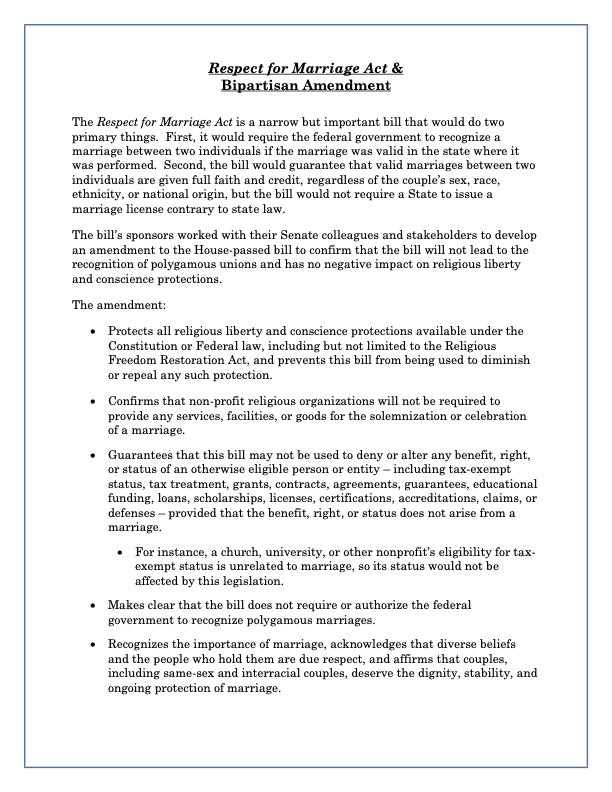The U.S. Senate is on track to pass legislation protecting same-sex marriage rights, after twelve Republicans (including Senator Joni Ernst) joined all Democrats in voting to proceed with debating the bill on November 16.
Senator Chuck Grassley was among the 37 Republicans who voted to block the bill. In a written statement, he claimed the legislation would “put people with certain sincere religious beliefs at greater legal risk,” even though a bipartisan amendment addressed concerns of religious organizations well enough to satisfy the Mormon Church.
Grassley also portrayed himself as supporting marriage equality: “Of course I believe that all married couples should be able to continue to benefit from the same federal rights and privileges that Barbara and I have enjoyed for 68 years – regardless of their race or sexual orientation.”
That’s not what he said when the U.S. Supreme Court struck down state bans on same-sex marriage, or when the Iowa Supreme Court struck down our state’s Defense of Marriage Act.
The revised Respect for Marriage Act retains key elements of the bill U.S. House members (including three Iowans) approved in July. It would repeal the federal Defense of Marriage Act, approved in 1996. It would also “require the federal government to recognize a
marriage between two individuals if the marriage was valid in the state where it was performed.” Finally, although the bill would not require states to issue marriage licenses to same-sex couples, it would require states to give marriages performed elsewhere “full faith and credit, regardless of the couple’s sex, race, ethnicity, or national origin.”
Ernst said in a statement that she backed the amendment because “I believe this bill protects religious freedoms and will simply maintain the status quo in Iowa.”
Congressional Democrats pushed for the bill after U.S. Supreme Court Justice Clarence Thomas wrote in a concurring opinion to the Dobbs case that having overturned Roe v. Wade, the court should reverse other precedents relying on a similar legal analysis. He specifically mentioned the 2015 Obergefell v. Hodges ruling on marriage equality, which recognized some liberty interests not explicitly named in the U.S. Constitution (privacy and the right to marry).
Grassley rejected the premise that marriage equality needs protecting, and implied it goes without saying that he wouldn’t want to undermine anyone’s marriage. From his written statement, enclosed in full below:
Interracial and same-sex marriages are not under threat, and I don’t support reversing the federal recognition of these marriages. Of course I believe that all married couples should be able to continue to benefit from the same federal rights and privileges that Barbara and I have enjoyed for 68 years – regardless of their race or sexual orientation. Marriage is a contract that often leads to many other contracts, and the federal government cannot void these agreements and upend the plans that couples have relied on for years.
To be clear, there is no effort in Congress or the courts to overturn Loving v. Virginia, which recognizes interracial marriages, or Obergefell v. Hodges, which recognizes same-sex marriages. I don’t believe the Supreme Court would reverse these cases even if they were challenged, and I don’t believe it is prudent for politicians to imply otherwise in order to fabricate unnecessary discontent in our nation.
That “Of course” threw me, because I didn’t recall Grassley welcoming the Obergefell decision, which cleared a path for marriage equality in all 50 states.
Sure enough, his written statement of June 26, 2015 was critical of the majority opinion. Far from accepting marriage equality as a settled matter, Grassley endorsed the idea of heterosexual majorities excluding others from enjoying the benefits of marriage. (emphasis added)
Traditional marriage has been a pillar of our society for thousands of years—one that has remained constant across cultures, even with the rise and fall of nations. I believe marriage is between one man and one woman. Marriage is a sacred institution. Its definition should not be subject to the whims of the Supreme Court where five justices appointed to interpret the Constitution instead imposed social and political values inconsistent with the text of the Constitution and the framers’ intent. Today’s decision robs the right of citizens to define marriage through the democratic process. […]
Although the decision is the law of the land, at least for now, history has taught us that a cultural debate like this one will not be settled with this ruling. I expect we will be debating marriage for years to come.
When the Iowa Supreme Court made our state the third to allow same-sex marriages in 2009, Grassley touted his support for the discriminatory federal law that’s about to be repealed.
I support traditional marriage. I voted for the Defense of Marriage Act, which was signed into law by President Clinton. It defines marriage as a union between one man and one woman and prevents states from being forced to honor the decisions of other state courts. I also voted twice in 2006, in the Judiciary Committee and on the Senate floor, for a joint resolution that would have amended the federal Constitution to define marriage as between one man and one woman.
There’s nothing wrong with changing one’s mind. Millions of Americans who once shared Grassley’s views on “traditional marriage” now accept equality for LGBTQ couples. Hundreds of elected officials who once voted for harmful bills on marriage, including Joe Biden and Tom Harkin, have evolved with time as well.
If Grassley admitted he used to be wrong on this issue, and apologized to LGBTQ Americans for his role in codifying discrimination against them, his latest comments would have more credibility.
It’s dishonest for the senator to imply he’d never want to deprive others of “the same federal rights and privileges that Barbara and I have enjoyed for 68 years.” He did just that, and bragged about it for a long time afterwards.
Congress should not pass up the chance to ensure that legal marriages will continue to be recognized, even if the U.S. Supreme Court allows Republican-controlled states to turn back the clock.
Appendix 1: Full text of November 16, 2022 news release from Grassley’s office:
WASHINGTON – Sen. Chuck Grassley (R-Iowa), today issued the following statement regarding the Senate’s vote on interracial and same-sex marriage:
“Interracial and same-sex marriages are not under threat, and I don’t support reversing the federal recognition of these marriages. Of course I believe that all married couples should be able to continue to benefit from the same federal rights and privileges that Barbara and I have enjoyed for 68 years – regardless of their race or sexual orientation. Marriage is a contract that often leads to many other contracts, and the federal government cannot void these agreements and upend the plans that couples have relied on for years.
“To be clear, there is no effort in Congress or the courts to overturn Loving v. Virginia, which recognizes interracial marriages, or Obergefell v. Hodges, which recognizes same-sex marriages. I don’t believe the Supreme Court would reverse these cases even if they were challenged, and I don’t believe it is prudent for politicians to imply otherwise in order to fabricate unnecessary discontent in our nation.
“While failing to adopt this bill would have no practical impact on the status quo, passing it would put people with certain sincere religious beliefs at greater legal risk without also providing sufficient opportunities for them to defend themselves.
“My vote against this bill is not about opposing the recognition of same-sex or interracial marriages; it’s about defending the religious liberty enshrined in our founding documents. This legislation is simply unnecessary. No one seriously thinks Obergefell is going to be overturned so we don’t need legislation. I’ve heard from multitudes of Iowans who are fearful of freedom of religion lawsuits,” Grassley said.
Appendix 2: Full text of June 26, 2015 news release from Grassley’s office:
Grassley Statement On The Supreme Court’s Ruling on Same-Sex Marriage
Senator Chuck Grassley of Iowa made the following statement after the Supreme Court released a decision on Obergefell v. Hodges.
“Traditional marriage has been a pillar of our society for thousands of years—one that has remained constant across cultures, even with the rise and fall of nations. I believe marriage is between one man and one woman. Marriage is a sacred institution. Its definition should not be subject to the whims of the Supreme Court where five justices appointed to interpret the Constitution instead imposed social and political values inconsistent with the text of the Constitution and the framers’ intent. Today’s decision robs the right of citizens to define marriage through the democratic process.
“Regardless of whether you agree or disagree with the Supreme Court’s decision, everyone deserves to be treated with respect, and nobody should have their deeply-held religious beliefs trampled by their government. Although the decision is the law of the land, at least for now, history has taught us that a cultural debate like this one will not be settled with this ruling. I expect we will be debating marriage for years to come.”
Appendix 3: Full text of statement Grassley’s office released on April 3, 2009, after the Iowa Supreme Court released its Varnum v Brien decision
“I support traditional marriage. I voted for the Defense of Marriage Act, which was signed into law by President Clinton. It defines marriage as a union between one man and one woman and prevents states from being forced to honor the decisions of other state courts. I also voted twice in 2006, in the Judiciary Committee and on the Senate floor, for a joint resolution that would have amended the federal Constitution to define marriage as between one man and one woman. Now, to change what’s happened with the Iowa Supreme Court decision, the state legislature would have to take action.”
Appendix 4: Fact sheet explaining the bipartisan amendment to the Respect for Marriage Act


Top image cropped from a photo Senator Chuck Grassley posted on Twitter on August 19, 2022, a few days before he and his wife Barbara celebrated their 68th anniversary.

